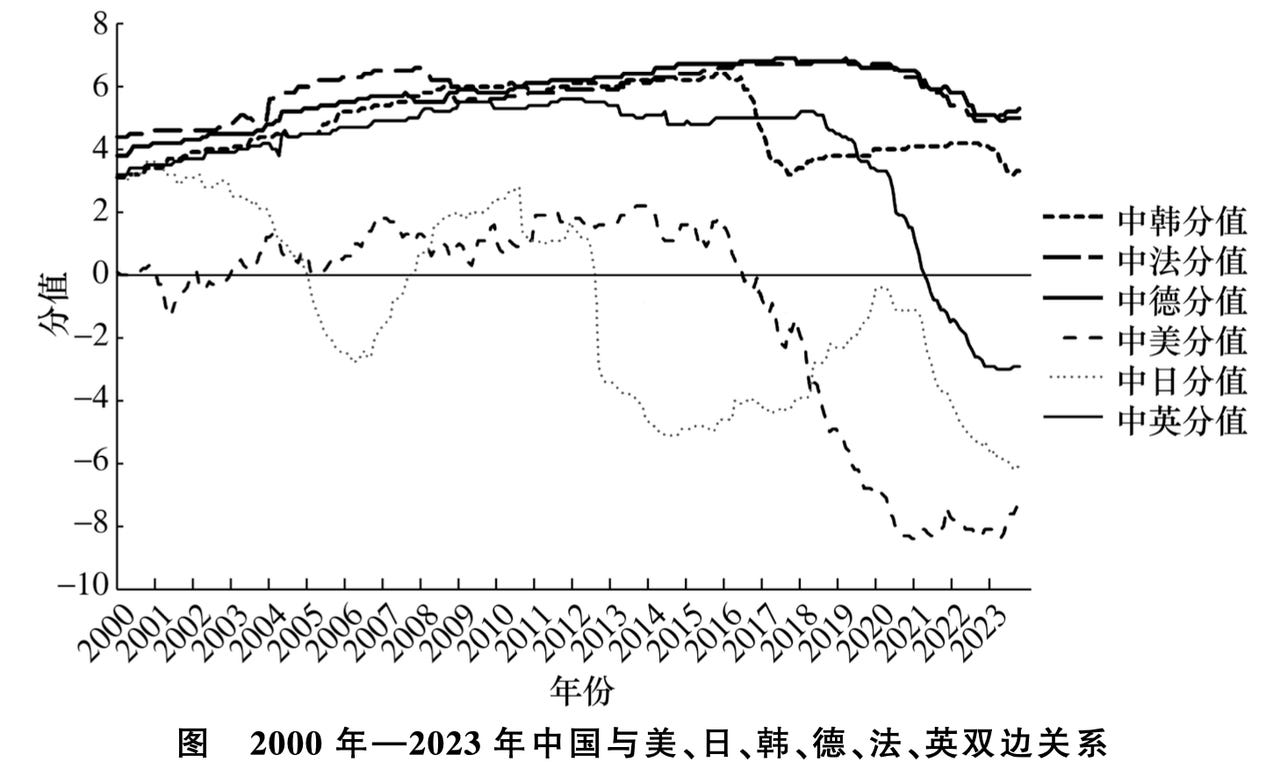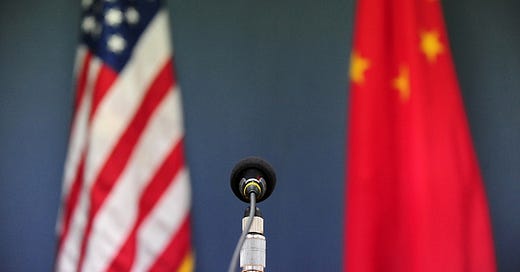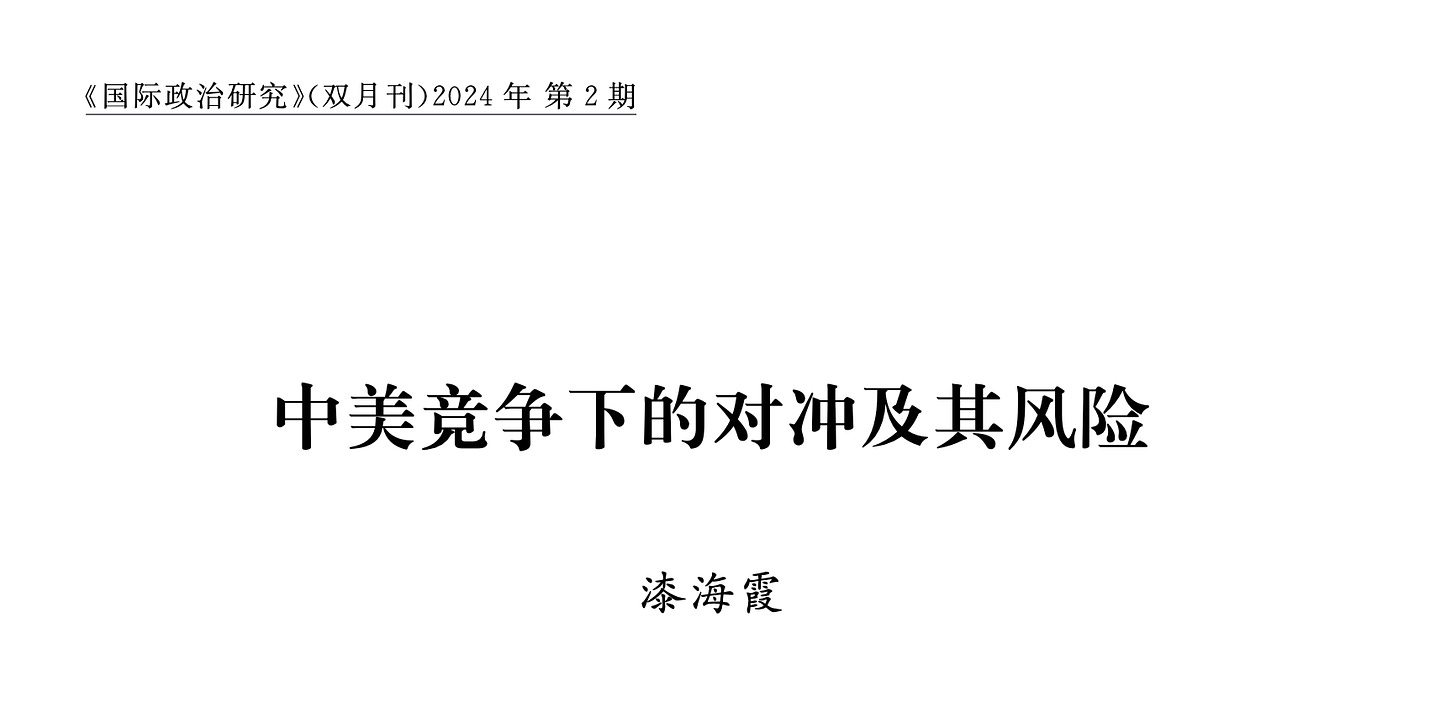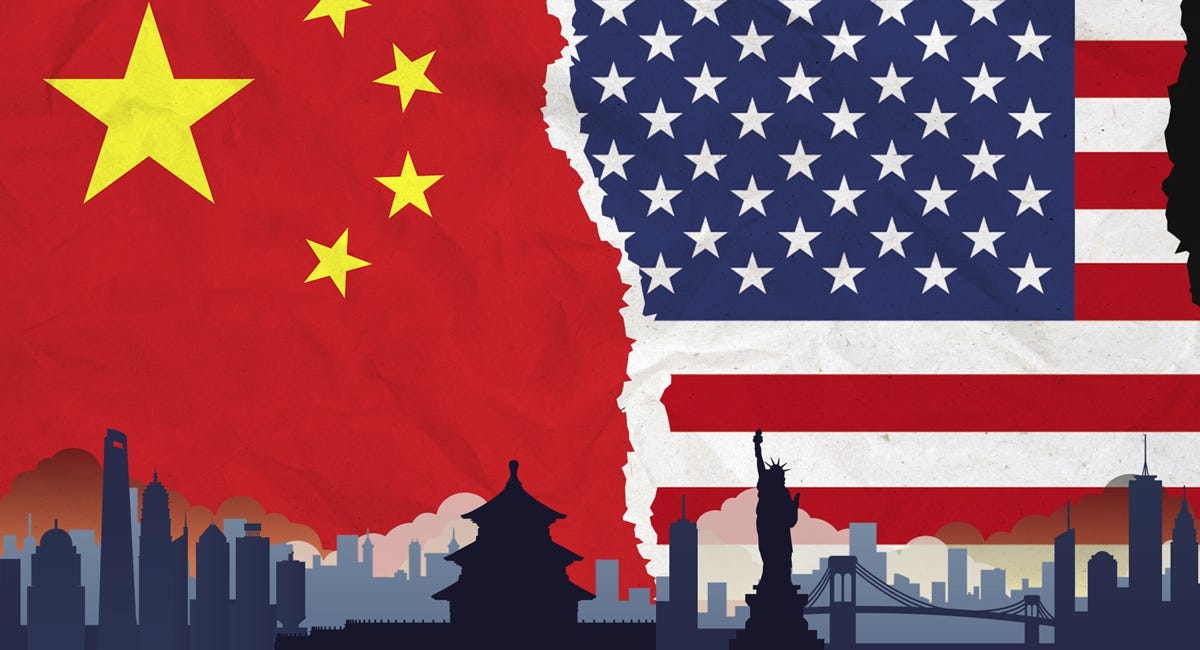Welcome to the 4th edition of our weekly newsletter! Recently, I traveled to Washington for research and engaged in discussions with some American scholars. I noticed that there seems to be a debate in the U.S. strategic community regarding U.S. policy toward China. While the scale and scope of this debate are clearly not as extensive as in 2014-2015, it still underscores the complexity of U.S.-China relations. The discussions primarily focus on the endgame of U.S.-China strategic competition, the Peak China theory, and the future of China's economy. I also plan to write a commentary on the current and next phase of U.S.-China relations, so please keep an eye on our newsletter.
ChinAffairs+ is a weekly newsletter that shares Chinese academic articles focused on topics such as China’s foreign policy, China-U.S. relations, China-European relations, and more. This newsletter was co-founded by me and my research assistant, ZHANG Xueyu. I am SUN Chenghao, a fellow with the Center for International Security and Strategy (CISS) at Tsinghua University, and currently a visiting scholar at the Paul Tsai China Center of Yale Law School in the United States.
Through carefully selected Chinese academic articles, we aim to provide you with key insights into the issues that China's academic and strategic communities are focused on. We will highlight why each article matters and the most important takeaways. Questions or criticisms may be addressed to sunchenghao@tsinghua.edu.cn
Summary
Hedging(对冲) is often seen as a risk-averse strategy, allowing countries to avoid taking sides in major power competitions like that between China and the U.S. However, this approach can also introduce new risks. Recent diplomatic actions by U.S. allies like South Korea, France, and Germany suggest that some are reconsidering or adjusting their hedging strategies. The intensifying U.S. pressure on its allies to adopt a tougher stance against China, combined with domestic political concerns, are key drivers of these new risks.
When the U.S. signals its firm resolve to counterbalance China and exerts pressure on its allies, these countries must reassess their positions. Those relying on hedging may find that it now carries higher costs and risks. Consequently, some allies might alter their strategies or even abandon hedging altogether. The extent of these shifts will depend largely on each country's national strength and internal political stability.
Why It Matters
As the world's two largest economies and influential powers, the competition between China and the United States not only shapes their own strategic decisions but also impacts the diplomatic trends and strategic choices of other countries, particularly those with close ties to both. Qi's article goes beyond a mere analysis of the current situation by exploring the factors that influence other nations' strategic choices in the context of this major power rivalry.
Through a review of the shifts in bilateral relations between China and the U.S., China and France, South Korea, Germany, Japan, and the U.K., the research highlights that as U.S.-China strategic competition intensifies, some countries have abandoned their "hedging" strategy of balancing between the two powers. Instead, they have moved closer to aligning with U.S. foreign policy, while other nations have shown greater stability in maintaining their middle-ground stance.
Qi argues that the U.S.’s recent efforts to send stronger signals of containment against China, alongside uniting its allies, have reduced the hedging space for third countries. These nations now face external pressures and must assess their ability to manage risks, absorb potential losses, and withstand pressure. Their strategic choices will depend on these factors, leading them to either continue hedging or align more clearly with one power's diplomatic policies. Additionally, the domestic political climate and public opinion in these countries play significant roles in shaping their foreign policy.
Given the realistic prospect of long-term U.S.-China strategic competition, examining the factors that affect the strategic decisions of other countries in this context provides valuable insights for forecasting future policy directions. Though the U.S. presidential election introduces some uncertainty, third countries will continue to face the same overarching U.S.-China competition whether Trump or Harris prevails.
However, as Qi mentioned, this article has certain limitations. For instance, while U.S.-China relations can influence, they cannot fundamentally dictate the international landscape. Furthermore, the presence of the U.S. alliance system may constrain the foreign policy choices of third countries with alliance commitments. These limitations weaken the explanatory power of this article’s conclusions in certain situations, while also opening avenues for future research.
Key Points
Unusual Changes in Diplomatic Strategies: Hedging has gained significant attention in international relations as U.S.-China competition has intensified. According to traditional balance of power theory, when competition between a hegemon and a rising power heats up, other countries quickly choose sides, either aligning with one or balancing against the other. However, since the U.S. announced its pivot to Asia in 2012, many countries did not immediately make a choice. In recent years, however, some countries like France, Germany, and South Korea have started adopting hedging policies and have taken a tougher stance toward China.

The U.S. balancing act of attraction and pressure amid U.S.-China competition
The intensifying competition between the U.S. and China is influenced by factors such as shifts in the balance of power, external crises, and changes in domestic politics. In the U.S., containing China has become a bipartisan consensus, and the current administration's hardline stance is further bolstered by concerns over appearing weak. In this context, U.S. allies have become more important, leaving less space for countries to hedge. Additionally, hedging itself introduces new risks.
As the U.S. strengthens its alliance system, the anticipated costs for allied nations to shift their foreign policy have changed: Before the intensification of U.S.-China competition, U.S. allies had significant room to hedge, and many pursued this strategy. However, as the U.S. consistently signals its intent to contain China and bolsters its alliances, allies are recognizing a firmer U.S. resolve, prompting shifts in their positions. For instance, France, aligning with the G7, stressed that China should not escalate tensions after Pelosi's visit to Taiwan. Similarly, South Korea's Yoon administration scaled back cooperation with China in economic and technological sectors after the U.S. introduced the "Chip 4" initiative.
In the context of signal confusion and shrinking hedging space, countries may face new risks of conflict: Although the U.S. has signaled its intention to "contain China," the development of its alliances is subject to various factors, including the upcoming U.S. elections and internal politics, which introduce uncertainty. As U.S.-China relations remain tense and signals from U.S. allies become less stable, the risk of miscalculations rises. Countries might deliberately send certain signals or stage events to sway the positions of their allies. Moreover, the shrinking space for hedging by third countries, along with the tightening of alliance structures, could result in an unintended alliance dilemma.
Differing attitudes of South Korean leaders toward key issues and external risks have contributed to a shift in the country’s stance amid rising U.S.-China tensions, exacerbating the situation on the Korean Peninsula: Under Moon Jae-in's administration, South Korea leaned towards China, seeking its influence to ease tensions with North Korea and mitigate the nuclear crisis. However, with Yoon Suk-yeol in power, there has been a shift towards strengthening the U.S.-South Korea alliance as a deterrent against North Korea. Additionally, the Russia-Ukraine conflict has heightened South Korea’s security concerns, leading to the signing of the "Washington Declaration" between the U.S. and South Korea in 2023.
Domestic political conditions and public opinion can influence the stance of U.S. allies, becoming new variables affecting shifts in hedging strategies: As U.S.-China competition intensifies and the internet and social media play an increasingly prominent role, public opinion on international affairs has become crucial for political parties and elections in many countries. In response, leaders of U.S. allies may adjust their foreign policies to align with domestic sentiment and voter preferences, potentially leading to a loosening of previously maintained hedging strategies.
Case Study - South Korea: As a representative of the conservative faction, Yoon Suk-yeol must ensure that his foreign policy aligns with the strategic inclinations of domestic conservatives to garner party support. Moreover, South Koreans' perceptions of the threat from North Korea may lead them to favor a security strategy that emphasizes reliance on the U.S.
Case Study - France: The unstable domestic political situation of French leaders makes Macron cautious about significantly improving relations with both China and the U.S. Although he was re-elected in 2022, his party did not secure an absolute majority in parliament. Domestic protests and strikes in France have also shaped his diplomatic approach, causing his policy toward China to be heavily influenced by the positions of other EU countries. Additionally, the losses European nations have faced from energy sanctions on Russia amid the Russia-Ukraine conflict have led the EU to adopt a "de-risking" strategy toward China, resulting in a degree of estrangement in China-France trade.
Conclusion: This article explores why some countries have altered their hedging policies in 2023 amid evolving U.S.-China relations and the implementation of hedging strategies by third countries. It argues that as competition between the U.S. and China intensifies, third countries—especially U.S. allies—experience a general contraction in their hedging options. Factors such as a country's resilience to risk, its capacity to withstand external pressures and potential losses, domestic political stability, and overall national strength can influence these nations' stances.
About the Author
QI Haixia 漆海霞: She is the associate Professor at the Department of International Relations, Deputy Dean of Institute of International Relations and Director of the International Relations Data and Computing Laboratory at Tsinghua University. Her research areas include conflict resolution theory, big data in international relations, and Chinese diplomacy. She has published dozens of articles in journals such as the Chinese Journal of International Politics, Social Sciences in China, and World Economy and Politics.
About the Publication
The Chinese version of the article was published by The Journal of International Studies(《国际政治研究》). This journal is a bimonthly academic journal sponsored by Peking University and published by the School of International Studies of Peking University and the Pan-Chinese Universities Association of International Politics Studies. As a leading journal in international studies in China, it is open to contributions by Chinese and foreign scholars and invites submission of academic articles on international relations theories, international security, international political economy, area studies as well as Chinese politics and foreign policy.
WU Xinbo on China-U.S. Relations: The General Trend and Short Cycles
Welcome to the 3rd edition of our weekly newsletter! ChinAffairs+ is a weekly newsletter that shares Chinese academic articles focused on topics such as China’s foreign policy, China-U.S. relations, China-European relations, and more. This newsletter was co-founded by me and my research assistant, ZHANG Xueyu. I am









